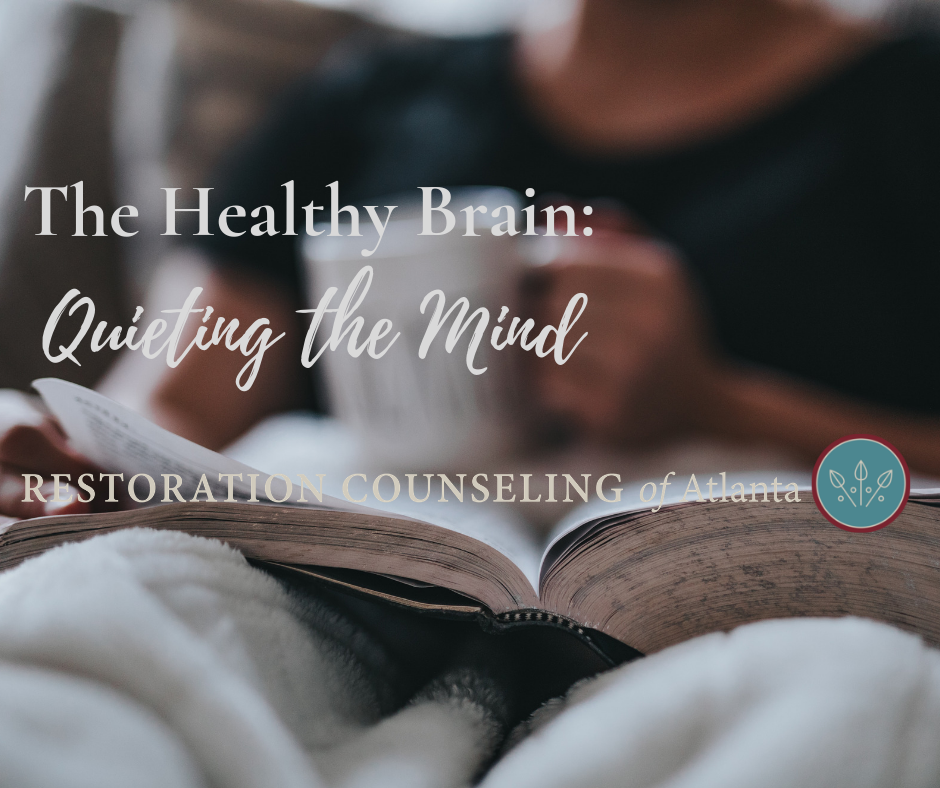In the July issue of The Restoration Report (our email newsletter), I shared the important role that rest plays in maintaining a healthy brain and mind. If you missed it, you can read the article on our blog here. If you don’t want to miss an article and would like to subscribe to our once a month email newsletter, please email Hannah at admin@restorationcounselingatl.com.
Have you ever found it difficult to rest and relax because your mind will not be still? These days, our brains are busy making decisions and processing massive amounts of information. If you experience any of the following symptoms, your healthy brain circuits have been damaged. It’s time to take some action!
The Symptoms You May Be Experiencing:
- Feeling like your mind doesn’t have the space to think about one more thing
- Struggling to be present and in the moment with the people you love and doing the things you enjoy
- Finding it difficult to sleep because you have racing thoughts
- Experiencing consistent negative thoughts and anxiety
- Having trouble controlling your temper and maintaining relationships
- Turning to alcohol, drugs, pornography, or food to ease emotional pain
Taking Action
Counseling is a great way to begin the process of healing and recovery. There is scientific evidence that shows that brain circuits physically change for the better as a result of talk therapy. During this process, however, it is important to intentionally learn how to quiet your mind through mindfulness and meditation so that the brain can rest and rewire itself in a healthy way.
What Exactly are Mindfulness and Meditation?
Mindfulness and meditation are mental activities that involve intentionally directing and keeping one’s thoughts, concentration, and attention on an object of focus. Recent advances in neuroscience show that practicing meditation and mindfulness improves memory, attention, emotional control, and even immune system functioning! God gave us the practices of mindfulness and meditation to help us maintain a healthy brain, and although modern neuroscience is proving the value of these practices, people have been reaping the benefits of intentionally being mindful and meditating for thousands of years.
In fact, Christian scripture talks often about meditation. In Psalm 4:4 David writes “Tremble, and do not sin; Meditate in your heart upon your bed and be still,” He addresses it again in Psalm 104:34, “Let my meditation be pleasing to Him; As for me, I shall be glad in the LORD, and in Psalm 145:5, “On the glorious splendor of Your majesty And on Your wonderful works, I will meditate.” How does intentionally directing and keeping thoughts, concentration and attention on an object of focus contribute so many benefits? The answer lies in a bit of biology.
A Bit of Biology
The brain is very complex, but an oversimplified answer to how meditation and mindfulness benefit us lies in understanding three brain regions: the limbic system, the prefrontal cortex, and the anterior cingulate cortex. The limbic system is a part of the brain that when activated causes us to experience fear, aggression, and the drives that lead to addiction. The prefrontal cortex is responsible for higher thinking, reasoning, and impulse control. The anterior cingulate cortex is a kind of bridge that connects the two regions. When our brain circuits are unhealthy, the limbic system becomes overly activated and we may experience emotions that drive us to various unhealthy and addictive behaviors.
A strong prefrontal cortex gives us mental clarity, makes us more aware of our thoughts and emotions and helps us make healthy decisions. When we meditate and engage in mindfulness, the prefrontal cortex and anterior cingulate cortex become active and grow stronger. They even grow in thickness, much like our muscles do after a great workout at the gym. As the prefrontal and anterior cingulate cortices grow stronger, the unhealthy activation in the limbic system decreases. In fact, over time, the unhealthy circuits in the limbic system physically shrink in size, leaving our brains stronger, more physically fit, and able to make decisions that lead to lasting health.
Ready to Get Started?
Adding a few minutes of mindfulness and meditation to your daily routine will lead to positive changes over time. There are phone apps, books, and even biofeedback devices that are available to help get you started. Here are a few of my favorites:
- Headspace – This phone app provides meditation and mindfulness education as well as guided meditation
- A Guide to True Peace – This short book, written by French theologian and author Francois Fenelon more than 200 years ago, provides Christians with a guide to the practical application of meditating on the Lord through inward spiritual prayer.
- Muse Meditation Device – This headband provides biofeedback to let users know when their mind is in a restful state. You can try a Muse meditation device at the Restoration Counseling of Atlanta office.
Go ahead; give mindfulness and meditation a try. If you have any questions along the way or would like some personal coaching to help you begin a meditation practice, just reach out to us. The Restoration counselors can help!
Peace!

Written by Andrea Brandt, NCC
andrea@restorationcounselingatl.com, ext. 154
Roswell Location
Andrea graduated this past May with a Master’s Degree in Clinical Mental Health Counseling (CMHC) from Richmont Graduate University, a Christ-centered academic environment. She is now serving clients at Restoration Counseling of Atlanta and offering reduced-cost counseling while pursuing her APC certification (Associate Professional Counselor).
Andrea’s education has equipped her to work with women, men, couples, and teens from various backgrounds who desire to change unwanted habits and behavior, reduce stress and depression related to daily living and past experiences, improve relationships, and enhance overall well-being. She also works with clients who are experiencing the pain of grief and loss.
References
Esch, T. (2014). The neurobiology of meditation and mindfulness. Meditation-Neuroscientific Approaches and Philosophical Implications. Studies in Neuroscience, Consciousness, and Spirituality. Springer International Publishing. Switzerland.
Stevens, F.L., Hurley, R.A., and Taber, K.H. (2011). Windows to the brain: anterior cingulate cortex: unique role in cognition and emotion. J.Neuropsychiatry Clinical Neuroscience 23:2.

